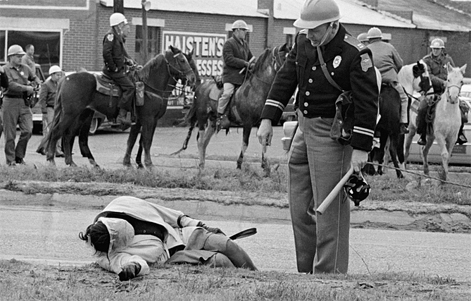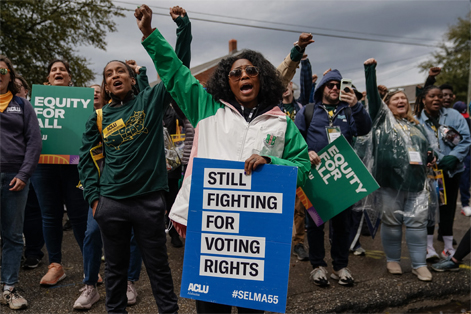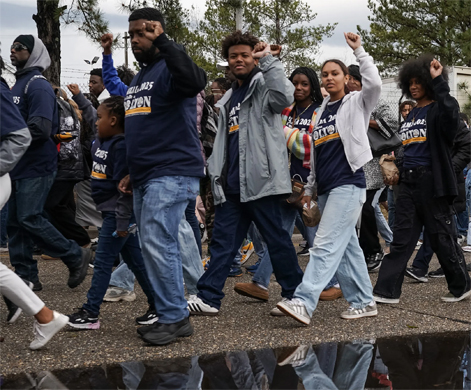|
|
|
|
|
|
 |
|
|
An
Alabama
officer
accosts
an
unconscious
woman as
mounted
police
officers
attack
civil
rights
marchers
in
Selma,
Alabama,
who were
attempting
to begin
a
50-mile
march to
Montgomery
to
protest
race
discrimination
in voter
registration
on March
7, 1965.
Photo:
Photo:
Bettmann
Archive/Getty
Images |
| |
After 60
Years:
March
across
the
Edmund
Pettus
Bridge
in
Selma,
Alabama
continues
By Li
Haung -
National-Politics
Tell Us
USA News
Network
SELMA,
AL - On
March 7,
1965,
Charles
Mauldin
joined a
line of
voting
rights
activists
marching
across
the
Edmund
Pettus
Bridge
in
Selma,
Alabama.
The
demonstration
aimed to
protest
the
systemic
disenfranchisement
of Black
voters
and the
recent
killing
of
Jimmie
Lee
Jackson,
a civil
rights
activist
fatally
shot by
a state
trooper.
As the
marchers
reached
the
crest of
the
bridge,
they
encountered
a
formidable
blockade
of state
troopers,
deputies,
and
mounted
officers.
Undeterred,
they
pressed
forward—only
to be
met with
orders
to
disperse,
followed
by a
brutal
assault.
Law
enforcement
officers
unleashed
billy
clubs,
tear
gas, and
cattle
prods on
the
peaceful
demonstrators,
indiscriminately
attacking
men,
women,
and
children.
This
horrific
event,
later
known as
"Bloody
Sunday,"
shocked
the
nation
and
galvanized
support
for the
Voting
Rights
Act of
1965.
Today,
its
annual
commemoration
honors
the
courage
and
sacrifice
of those
who
fought
for
Black
Americans'
right to
vote
while
highlighting
the
ongoing
struggle
for
equality.

A rally
outside
Selma's
Brown
Chapel
AME
Church
during
"Bloody
Sunday"
commemorations
on March
9.
Photo:
Elijah
Nouvelage/AFP
via
Getty
Images
Selma
marked
the 60th
anniversary
of
Bloody
Sunday
with
speeches
and a
symbolic
march
across
the
Edmund
Pettus
Bridge.
Speaking
at the
historic
Tabernacle
Baptist
Church,
House
Minority
Leader
Hakeem
Jeffries
underscored
Selma's
role in
reshaping
the
nation
and
warned
against
attempts
to
distort
historical
truths.
He
called
for
continued
vigilance
in the
face of
modern
challenges
to
democracy.
U.S.
Representative
Terri
Sewell
of
Alabama
addressed
the
crowd,
drawing
attention
to a
wave of
voting
restrictions
introduced
after
the U.S.
Supreme
Court
weakened
key
provisions
of the
Voting
Rights
Act.
Other
speakers
reflected
on the
rollback
of
diversity,
equity,
and
inclusion
initiatives
under
the
Trump
administration,
likening
the
present-day
struggle
to the
civil
rights
battles
of the
1960s.
The
event
culminated
in a
march
led by
members
of
Congress,
Bloody
Sunday
participants,
and
thousands
of
others.
At the
site of
the 1965
attack,
they
paused
for
prayer.
Reflecting
on the
past,
Charles
Mauldin
recalled
the
determination
and
indignation
of the
original
marchers,
emphasizing
that the
U.S. was
not a
true
democracy
for
Black
citizens
until
voting
rights
legislation
was
enacted.
He
stressed
the
continued
need to
fight
for
genuine
equality.

Students
march to
the
Edmund
Pettus
Bridge
during
commemorations
of the
60th
anniversary
of
"Bloody
Sunday"
on March
9 in
Selma.
Photo:
Elijah
Nouvelage/AFP
via
Getty
Images
Other
attendees
shared
personal
memories
of that
day.
Kirk
Carrington,
just 13
years
old at
the
time,
recalled
being
chased
by a man
on
horseback
wielding
a stick.
Dr.
Verdell
Lett
Dawson,
a Selma
native,
spoke of
the
racial
norms
that
defined
her
childhood,
such as
avoiding
eye
contact
with
white
individuals.
Both
voiced
concerns
about
the
potential
dismantling
of
federal
agencies
that
have
historically
upheld
civil
rights
protections.
The
commemoration
was not
just a
remembrance
of the
past—it
was also
a call
to
action.
Speakers
and
attendees
acknowledged
the
progress
made
since
Bloody
Sunday
while
urging
continued
advocacy
to
protect
democracy
and
advance
equality
in the
United
States.
|
|
|
|
|
|
|
|
|